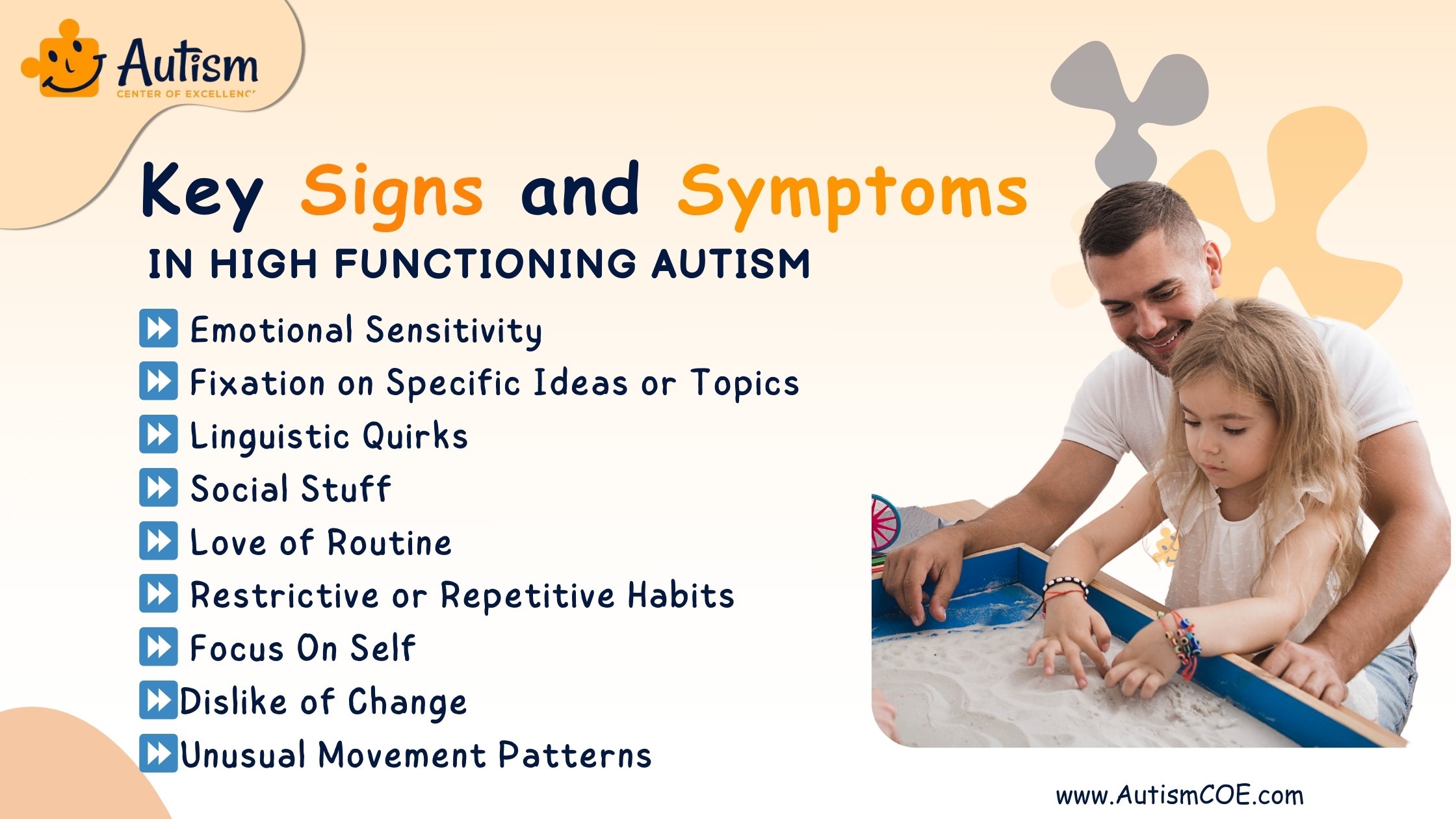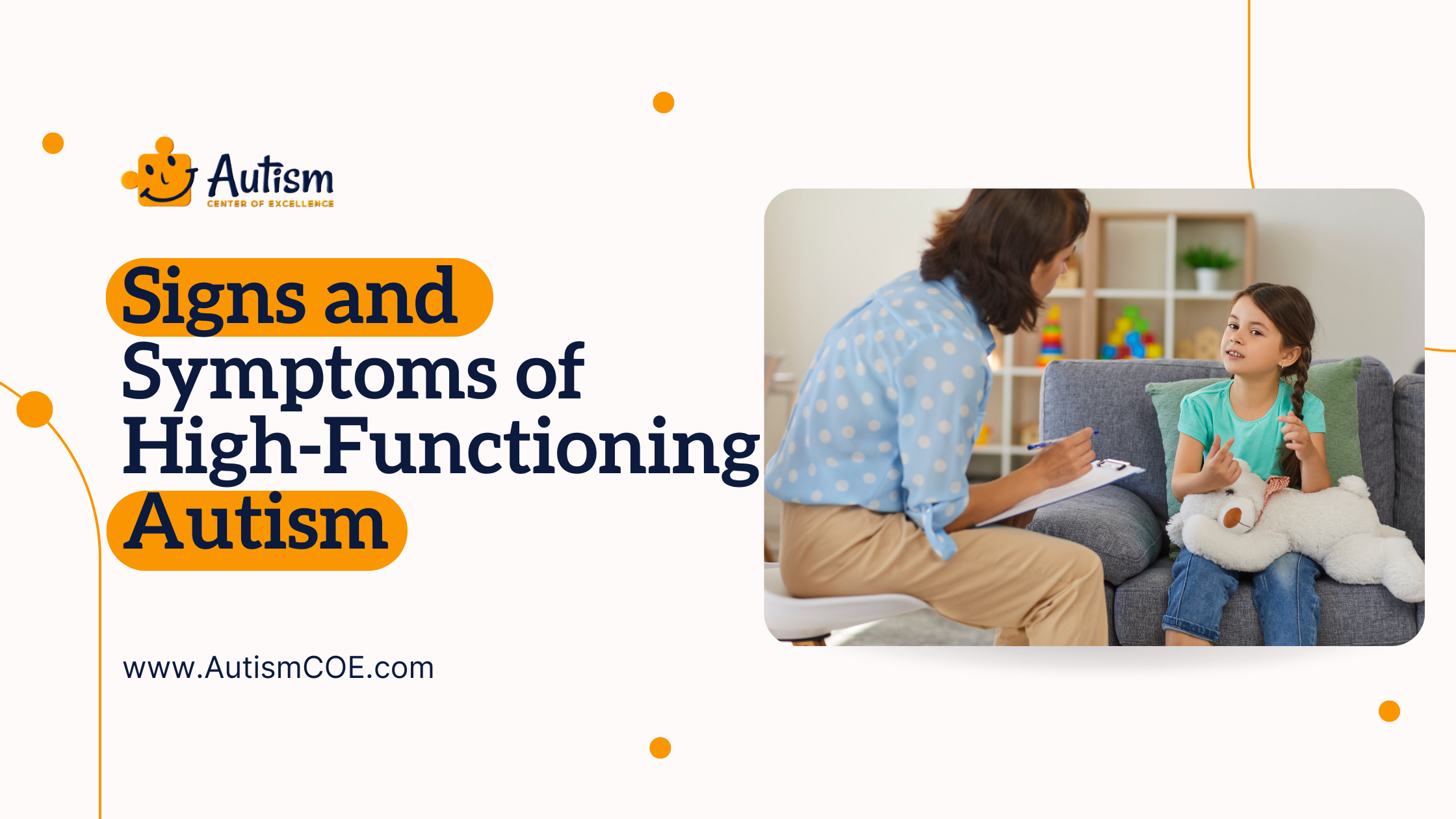High functioning autism is a term that is used more and more but often misused. Unlike classic autism, people with high functioning autism (Asperger’s Syndrome) don’t show the obvious signs. This means a lot of cases go undiagnosed or misdiagnosed. For educators, healthcare professionals and parents, recognising and understanding the subtle signs and symptoms is key. Early intervention and support can make all the difference. Recognizing the early signs of autism is crucial for timely intervention and accurate diagnosis.
What is High Functioning Autism Spectrum Disorder
High-functioning autism (HFA) is a term used to describe individuals on the autism spectrum who do not have an intellectual disability but may still face challenges with social interaction and communication. People with HFA often have strong living skills, including communication abilities, that enable them to live independently. However, the term is not officially recognized in medical diagnoses and can be somewhat subjective, as it overlaps with what was formerly known as Asperger’s syndrome.
Key Signs and Symptoms
As awareness of Autism Spectrum Disorder (ASD) grows more people are starting to realize the many symptoms of those on the spectrum. This is crucial so people with autism get the support they need to live full and productive lives. By knowing the common symptoms of high functioning autism parents and professionals can make informed decisions about interventions and support.

Emotional Sensitivity
Emotional sensitivity is a hallmark of high functioning autism often missed. People with this trait feel emotions more intensely than neurotypical people. Everyday setbacks like spilling coffee can cause an over the top emotional reaction and impact their ability to focus and manage stress for the rest of the day.
This heightened emotional sensitivity can significantly affect a child’s development and daily functioning, making it essential for parents to monitor and address any potential signs of developmental delays.
Fixation on Specific Ideas or Topics
Another common trait is a strong interest in specific subjects. This can manifest as repetitive talking, listening to a favourite song on repeat or diving deep into one topic. While this can get in the way of daily life or relationships, it can also lead to amazing achievements, as many successful people with high functioning autism.
Linguistic Quirks
Unlike those with low functioning autism, those at the high functioning end of the spectrum often develop language skills early and have a big vocabulary. But they can find regular conversations boring or hard to follow and come across as odd because of their unique way of talking and interest in niche topics. In contrast, other children might initially develop language skills more typically before showing any signs of autism.
Social Stuff
Social interactions can be tough for high functioning autistics. This can mean a smaller social circle, difficulties in group activities or sharing as a child and teenager. These social difficulties often come from not being able to intuitively pick up on social cues or expectations.
Love of Routine
Many high functioning autistics love routine. They will stick to daily schedules and do things in a certain order. Any deviation from these routines can cause frustration or anxiety.
Restricted and Repetitive Behaviors
These can be habits of movement or specific rituals like turning lights on and off multiple times. These can interfere with daily life and need guidance to manage so they don’t become a problem.
Focus On Self
Focusing too much on yourself can make it hard to form deep connections with others. This can be seen as self centered but is often a reflection of not understanding or being able to put yourself in others shoes.
Dislike of Change
Change can be a big stress for high functioning autistics. Consistency in daily routines, meals or environment brings comfort and any change can bring anxiety and distress.
Unusual Movement Patterns
Finally, unusual movement patterns like toe walking is sometimes seen. These can cause physical discomfort or issues but can often be addressed with early intervention and therapy. Historically, such movement patterns were classified under pervasive developmental disorder.
Not everyone who displays these symptoms has high functioning autism. But if several of these symptoms are present, it’s best to consult a doctor for a full evaluation. For those who are looking for support, reaching out to specialized services can guide and help you manage these symptoms.
Autism Diagnosis
Autism diagnosis involves a full assessment of an individual’s behaviour, communication and social interactions. This involves developmental and behavioural screenings, direct observations and interviews with family members and carers. Medical and developmental history is also reviewed.
The American Psychiatric Association’s Diagnostic and Statistical Manual of Mental Disorders (DSM-5) is the criteria for diagnosing ASD. According to the DSM-5:
⏩Persistent difficulties with social communication and social interaction
⏩Restricted, repetitive patterns of behaviour, interests or activities
⏩Symptoms must be present in the early developmental period
⏩Symptoms must cause significant impairment in social, occupational or other important areas of functioning
Early and accurate diagnosis is essential for accessing the necessary support and interventions that can significantly improve outcomes for individuals with ASD.
Risk Factors and Causes
While we don’t know all the causes of Autism Spectrum Disorder (ASD) we do know some of the risk factors. These include:
- Genetic: If you have a family history of ASD you are more likely to have it.
- Older Parents: If you are an older parent you are more likely to have a child with ASD.
- Premature Birth: If you were born premature you are more likely to have ASD.
- Low Birth Weight: If you were born with a low birth weight you are more likely to have ASD.
- Certain Genetic Conditions: Conditions like fragile X syndrome are more likely to have ASD.
Understanding these risk factors can help in early identification and intervention, which are crucial for supporting individuals with ASD.
Complications and Co-occurring Conditions
People with Autism Spectrum Disorder (ASD) often have more going on than the core symptoms of the disorder. These co-occurring conditions can really impact their life and need to be managed. Common complications are:
👉Mental Health Conditions: Anxiety, depression and other mental health issues are more common in people with ASD.
👉Sleep Conditions: Insomnia and sleep apnea are common in people with ASD.
👉Gastrointestinal Conditions: Constipation and diarrhea are common in people with ASD.
👉Seizure Conditions: Epilepsy and other seizure related conditions are more common in people with ASD.
Addressing these co-occurring conditions is essential for improving the overall well-being of individuals with ASD.
Join Our Weekly Newsletters!
Subscribe now to stay updated with our latest email updates.
Early Intervention
If you spot these signs early it can make all the difference. Therapy, special education plans and social skills training can help manage symptoms and live. The increasing number of children diagnosed with autism highlights the importance of early intervention to ensure they receive the necessary support and professional evaluation.
Awareness and Education
Awareness and education is key. Many educators and healthcare professionals are not trained to spot the subtle signs of high functioning autism. Parents are fighting a losing battle to get a diagnosis and support for their children. Recognizing the signs of autism early is crucial for timely diagnosis and support. By educating ourselves we can create better support systems and interventions.
Treatment and Therapy Options
There is no cure for Autism Spectrum Disorder (ASD) but there are many treatment and therapy options to help manage the symptoms and improve life. Here are some:
Behavioral Therapies: ABA and PBS can help develop social and communication skills.
Speech and Language Therapies: To improve communication and interact better with others.
Occupational Therapies: To develop daily living skills and participate more in activities.
Medications: Antidepressants and antipsychotics can be prescribed to manage anxiety, depression and other mental health issues.
By utilizing these therapies and treatments, individuals with ASD can achieve significant improvements in their daily lives and overall well-being.
Unique Strengths and Contributions
While the focus is on the difficulties, it’s just as important to acknowledge the unique strengths and contributions of people with high functioning autism. Their intense focus and expertise can lead to great achievements in many areas. From technology and science to arts and humanities, people with high functioning autism bring valuable perspectives and skills.
In the Workplace
Employers are starting to recognize the benefits of neurodiversity in the workplace. With the right support, people with high functioning autism can excel in roles that require attention to detail, creative thinking and specialized knowledge. Creating inclusive work environments benefits these individuals and the workplace as a whole with diverse talent.
Frequently Asked Questions & Answer
What Are Some Signs of Emotional Sensitivity in High-functioning Autism?
People with high-functioning autism feel emotions intensely and can’t regulate them. Minor setbacks can trigger big emotional reactions making it hard to manage stress and focus.
How Does Fixation on Specific Topics Show Up in High-functioning Autism?
They get deeply interested in certain subjects and have repetitive conversations or activities about those topics. Sometimes it can get in the way of daily life but can also lead to expertise and achievements in those areas.
What Linguistic Quirks Are Seen in High-functioning Autism?
They develop language skills early and have a big vocabulary. But they find regular conversations dull or hard to follow and often focus on niche topics and speak in an unconventional way.
Why is Routine Important for People With High-functioning Autism?
Routines give them a sense of comfort and predictability. Any disruption to routine can cause anxiety or frustration, hence the need for structure in their daily life.
How Does Self-focus Impact Social Relationships in High-functioning Autism?
Self-focus can hinder deep social connections. This is often because they can’t understand others’ perspectives rather than intentional self-centeredness.
Conclusion
High functioning autism is a tricky condition. Knowing the subtle signs and symptoms is the first step to getting the support and intervention these people need to flourish. Awareness and education is key to a more inclusive world where everyone can bring their strengths to the table.
For educators, healthcare professionals and parents, understanding high functioning autism can make a big difference. Let’s get on board and support and celebrate the many abilities and talents of people with high functioning autism.
AutismCOE is leading the charge in advocating for and delivering early intervention. We provide programs and resources to help families through the autism journey and get their child the best possible care.
Please Note: The content of this blog is for informational purposes only and should not be considered a substitute for professional medical advice, diagnosis, or treatment. Consult a qualified health care professional for personalized guidance tailored to your specific situation.

Bhavika Bhasin
Bhavika Bhasin is the Research and Marketing officer at AutismCOE. She works with children and adults with ASD. Her clinical research includes evaluating various available autism screening and diagnosis methods and their efficacy. She is currently developing a novel screening exam that is indicated to be more accurate than the existing available exams. She is also writes articles papers for various publications.


